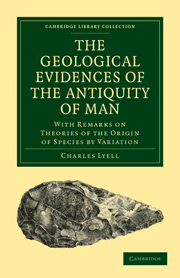 The Geological Evidences of the Antiquity of Man
The Geological Evidences of the Antiquity of Man Book contents
- Frontmatter
- Contents
- CHAPTER I INTRODUCTION
- CHAPTER II RECENT PERIOD—DANISH PEAT AND SHELL MOUNDS—SWISS LAKE DWELLINGS
- CHAPTER III FOSSIL HUMAN REMAINS AND WORKS OF ART OF THE RECENT PERIOD
- CHAPTER IV POST-PLIOCENE PERIOD: BONES OF MAN AND EXTINCT MAMMALIA IN BELGIAN CAVERNS
- CHAPTER V POST-PLIOCENE PERIOD: FOSSIL HUMAN SKULLS OF THE NEANDERTHAL AND ENGIS CAVES
- CHAPTER VI POST-PLIOCENE ALLUVIUM AND CAVE DEPOSITS WITH FLINT IMPLEMENTS
- CHAPTER VII PEAT AND POST-PLIOCENE ALLUVIUM OF THE VALLEY OF THE SOMME
- CHAPTER VIII POST-PLIOCENE ALLUVIUM WITH FLINT IMPLEMENTS OF THE VALLEY OF THE SOMME—concluded
- CHAPTER IX WORKS OF ART IN POST-PLIOCENE ALLUVIUM OF FRANCE AND ENGLAND
- CHAPTER X CAVERN DEPOSITS, AND PLACE OF SEPULTURE OF THE POST-PLIOCENE PERIOD
- CHAPTER XI AGE OF HUMAN FOSSILS OF LE PUY IN CENTRAL FRANCE AND OF NATCHEZ ON THE MISSISSIPPI, DISCUSSED
- CHAPTER XII ANTIQUITY OF MAN RELATIVELY TO THE GLACIAL PERIOD AND TO THE EXISTING FAUNA AND FLORA
- CHAPTER XIII CHRONOLOGICAL RELATIONS OF THE GLACIAL PERIOD AND THE EARLIEST SIGNS OF MAN'S APPEARANCE IN EUROPE
- CHAPTER XIV CHRONOLOGICAL RELATIONS OF THE GLACIAL PERIOD AND THE EARLIEST SIGNS OF MAN'S APPEARANCE IN EUROPE—continued
- CHAPTER XV EXTINCT GLACIERS OF THE ALPS AND THEIR CHRONOLOGICAL RELATION TO THE HUMAN PERIOD
- CHAPTER XVI HUMAN REMAINS IN THE LOESS, AND THEIR PROBABLE AGE
- CHAPTER XVII POST-GLACIAL DISLOCATIONS AND FOLDINGS OF CRETACEOUS AND DRIFT STRATA IN THE ISLAND OF MÖEN, IN DENMARK
- CHAPTER XVIII THE GLACIAL PERIOD IN NORTH AMERICA
- CHAPTER XIX RECAPITULATION OF GEOLOGICAL PROOFS OF MAN'S ANTIQUITY
- CHAPTER XX THEORIES OF PROGRESSION AND TRANSMUTATION
- CHAPTER XXI ON THE ORIGIN OF SPECIES BY VARIATION AND NATURAL SELECTION
- CHAPTER XXII OBJECTIONS TO THE HYPOTHESIS OF TRANSMUTATION CONSIDERED
- CHAPTER XXIII ORIGIN AND DEVELOPMENT OF LANGUAGES AND SPECIES COMPARED
- CHAPTER XXIV BEARING OF THE DOCTRINE OF TRANSMUTATION ON THE ORIGIN OF MAN, AND HIS PLACE IN THE CREATION
- INDEX
CHAPTER XXII - OBJECTIONS TO THE HYPOTHESIS OF TRANSMUTATION CONSIDERED
Published online by Cambridge University Press: 29 August 2010
- Frontmatter
- Contents
- CHAPTER I INTRODUCTION
- CHAPTER II RECENT PERIOD—DANISH PEAT AND SHELL MOUNDS—SWISS LAKE DWELLINGS
- CHAPTER III FOSSIL HUMAN REMAINS AND WORKS OF ART OF THE RECENT PERIOD
- CHAPTER IV POST-PLIOCENE PERIOD: BONES OF MAN AND EXTINCT MAMMALIA IN BELGIAN CAVERNS
- CHAPTER V POST-PLIOCENE PERIOD: FOSSIL HUMAN SKULLS OF THE NEANDERTHAL AND ENGIS CAVES
- CHAPTER VI POST-PLIOCENE ALLUVIUM AND CAVE DEPOSITS WITH FLINT IMPLEMENTS
- CHAPTER VII PEAT AND POST-PLIOCENE ALLUVIUM OF THE VALLEY OF THE SOMME
- CHAPTER VIII POST-PLIOCENE ALLUVIUM WITH FLINT IMPLEMENTS OF THE VALLEY OF THE SOMME—concluded
- CHAPTER IX WORKS OF ART IN POST-PLIOCENE ALLUVIUM OF FRANCE AND ENGLAND
- CHAPTER X CAVERN DEPOSITS, AND PLACE OF SEPULTURE OF THE POST-PLIOCENE PERIOD
- CHAPTER XI AGE OF HUMAN FOSSILS OF LE PUY IN CENTRAL FRANCE AND OF NATCHEZ ON THE MISSISSIPPI, DISCUSSED
- CHAPTER XII ANTIQUITY OF MAN RELATIVELY TO THE GLACIAL PERIOD AND TO THE EXISTING FAUNA AND FLORA
- CHAPTER XIII CHRONOLOGICAL RELATIONS OF THE GLACIAL PERIOD AND THE EARLIEST SIGNS OF MAN'S APPEARANCE IN EUROPE
- CHAPTER XIV CHRONOLOGICAL RELATIONS OF THE GLACIAL PERIOD AND THE EARLIEST SIGNS OF MAN'S APPEARANCE IN EUROPE—continued
- CHAPTER XV EXTINCT GLACIERS OF THE ALPS AND THEIR CHRONOLOGICAL RELATION TO THE HUMAN PERIOD
- CHAPTER XVI HUMAN REMAINS IN THE LOESS, AND THEIR PROBABLE AGE
- CHAPTER XVII POST-GLACIAL DISLOCATIONS AND FOLDINGS OF CRETACEOUS AND DRIFT STRATA IN THE ISLAND OF MÖEN, IN DENMARK
- CHAPTER XVIII THE GLACIAL PERIOD IN NORTH AMERICA
- CHAPTER XIX RECAPITULATION OF GEOLOGICAL PROOFS OF MAN'S ANTIQUITY
- CHAPTER XX THEORIES OF PROGRESSION AND TRANSMUTATION
- CHAPTER XXI ON THE ORIGIN OF SPECIES BY VARIATION AND NATURAL SELECTION
- CHAPTER XXII OBJECTIONS TO THE HYPOTHESIS OF TRANSMUTATION CONSIDERED
- CHAPTER XXIII ORIGIN AND DEVELOPMENT OF LANGUAGES AND SPECIES COMPARED
- CHAPTER XXIV BEARING OF THE DOCTRINE OF TRANSMUTATION ON THE ORIGIN OF MAN, AND HIS PLACE IN THE CREATION
- INDEX
Summary
Theory of Transmutation—Absence of Intermediate Links.
THE most obvious and popular of the objections urged against the theory of transmutation may be thus expressed : If the extinct species of plants and animals of the later geological periods were the progenitors of the living species, and gave origin to them by variation and natural selection, where are all the intermediate forms, fossil and living, through which the lost types must have passed during their conversion into the living ones? And why do we not find almost everywhere passages between the nearest allied species and genera, instead of such strong lines of demarcation, and often wide intervening gaps?
We may consider this objection under two heads: —
First, To what extent are the gradational links really wanting in the living creation or in the fossil world, and how far may we expect to discover such as are missing by future research?
Secondly, Are the gaps more numerous than we ought to anticipate, allowing for the original defective state of the geological records, their subsequent dilapidation, and our slight acquaintance with such parts of them as are extant, and allowing also for the rate of extinction of races and species now going on, and which has been going on since the commencement of the tertiary period?
- Type
- Chapter
- Information
- The Geological Evidences of the Antiquity of ManWith Remarks on Theories of the Origin of Species by Variation, pp. 424 - 453Publisher: Cambridge University PressPrint publication year: 2009First published in: 1863


